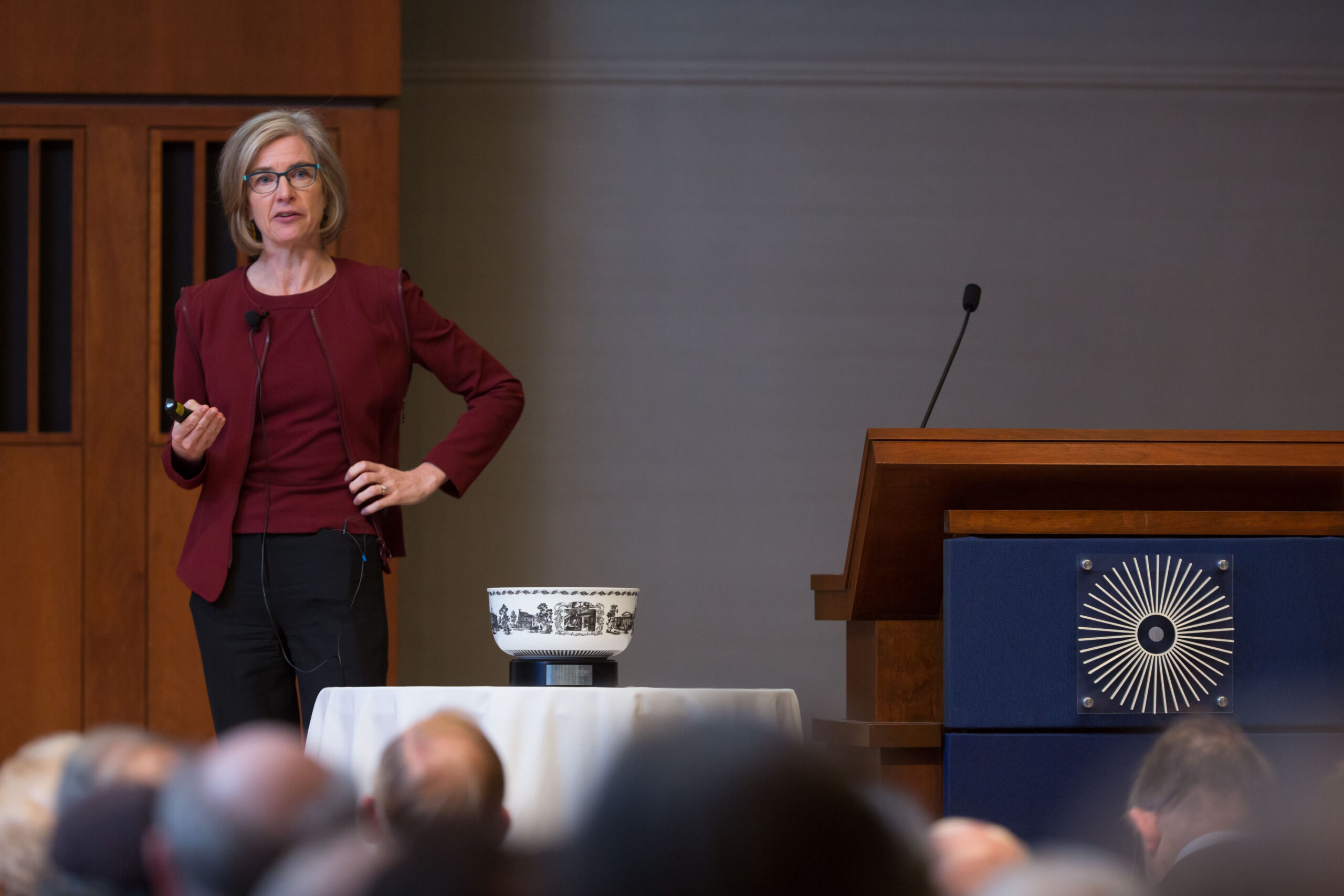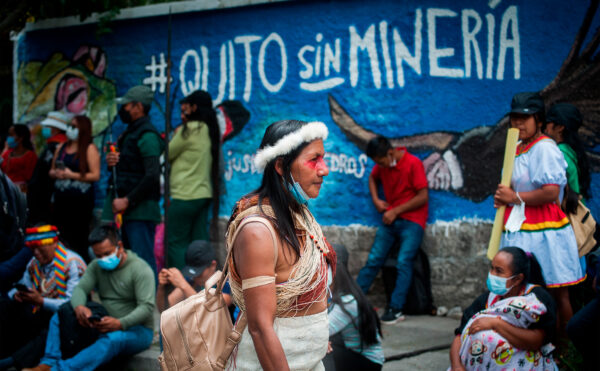Biochemist Jennifer Doudna and her colleagues rocked the research world in 2012 when they described a simple way of editing the DNA of any organism using an RNA-guided protein found in bacteria. Discovery of the CRISPR-Cas9 technology sharply accelerated work on human and nonhuman gene editing, helping researchers develop potential treatments for HIV, sickle-cell disease, and muscular dystrophy. Doudna, a professor at the University of California, Berkeley, and an investigator with the Howard Hughes Medical Institute, has become the public face of CRISPR and an advocate for robust public discussion of the ethical implications of gene editing. In November 2018 she visited the Science History Institute to give the annual Ullyot Public Affairs Lecture and receive the accompanying award. Before the talk Distillations writer Meir Rinde sat down with Doudna to find out what scientists can do with CRISPR, whether we should worry about designer embryos, and how to grow 500 tomatoes on a single plant.
This interview has been condensed and edited for clarity.
What do nonscientists and the public need to know about CRISPR and gene editing?
Maybe we could start with what I hope is an easy-to-understand explanation: what is gene editing? It’s a way of altering the DNA in cells, the code of life, if you will, in a precise fashion that allows things like changing DNA sequences that cause disease or introducing changes to DNA that allow scientists to understand what genes do and how they interact. You might say, “Well, that sounds cool, but it sounds really hard.” And it might sound like science fiction, and for a long time it was absolutely science fiction. And then over the last roughly 15 years or so, technologies for altering DNA sequences—and doing it precisely and inside of cells—have increasingly become available. Most recently, a technology known as CRISPR is the tool that has really opened up this area of science in a way that was not possible before. It’s a technology based on a bacterial immune system, [in which] bacteria find and cut up viral DNA, that is now being utilized to find and alter DNA sequences inside of cells or organs or even entire organisms.
So scientists now have a way not only to manipulate genes but also to really ask fundamental questions about the way whole genomes are organized—a genome is the entire DNA content of a cell or an organism—and also to get beyond research into actual applications. We’re now in an era where people are actually working and contemplating, in the not-distant future, a time when we can cure genetically caused diseases like Duchenne muscular dystrophy, sickle-cell anemia, Huntington disease, cystic fibrosis. These are all diseases that have a very well-defined genetic cause, but until recently it wasn’t possible to do anything about them. Now we have a technology that enables this. We’re entering an era where we can see these clinical opportunities coming along.
As far as using CRISPR for medical uses, where is that most advanced?
For practical reasons the areas that have advanced most quickly have been in applications in the blood. So sickle-cell disease has a well-documented genetic basis, and it’s appealing as a target for genome editing because it’s possible to take blood stem cells from a patient and alter them outside the body, verify that the editing is done correctly, and then put the cells back in. So that’s an application of genome editing that is probably the farthest along in terms of clinical development. But there are other things that maybe are not that far behind. I recently saw work presented from a lab in Texas that’s been studying Duchenne muscular dystrophy, which affects primarily young boys and is devastating. It causes muscle wasting and early death—again, a disease that has a well-known single gene that is defective. Very recently, the CRISPR technology was used to correct the disease-causing mutation for muscular dystrophy in dogs. This shows that in principle there’s a path forward for treating this disease, and not only treating it but actually curing it at the level of the DNA. It’s not at a point where it’s ready to go into humans yet because it needs to be thoroughly tested for safety and effectiveness, but I think we can anticipate that in the next 5 to 10 years, therapies and even cures like this are on the horizon.
[Interviewer’s note: In April 2019 patients were treated with a CRISPR-based therapy for the first time ever in the United States. NPR reported that researchers at the University of Pennsylvania treated two cancer patients who had relapsed after undergoing standard treatment, one for multiple myeloma and the other for sarcoma. Immune system cells were removed, genetically modified in the lab, and infused back into the patients. The results of the trial had not yet been released at the time of publication.]
You’ve mentioned some uses of the technology for crops and for production of chemicals. Can you talk about those?
The CRISPR technology has now been demonstrated in a wide range of crops and other kinds of plants. All of the major food crops—wheat, rice, sorghum—have been modified using CRISPR technology, until now mostly for proof of principle, showing that this is a technology that works in those kinds of organisms and cells. But in the not-distant future we’re all, I think, going to be starting to utilize these kinds of plants in our lives, whether it’s for food or other purposes.
If you think about the definition of gene editing—a precise way to alter DNA in cells—there is a really important distinction between what this technology enables and what’s been traditionally done for plant breeding. Humans have been altering plants for millennia, basically ever since the origin of agriculture. And how do they do it? Well, they breed plants—and today modern plant breeders use radiation or chemicals to randomly mutate the DNA of seeds—and then select the crops or plants that have desired traits. Who knows what the genetic changes are? They don’t ever map those. They just select for desired traits. Everything we eat is [genetically modified], if you think about it.
What’s exciting about the CRISPR technology is that we now have a way to make changes precisely. Increasingly we know the full DNA sequences in different kinds of plants, and increasingly we know genes that are responsible for particular traits. It takes many, many years to [make changes] by traditional plant breeding. You have to find the trait you want, and that takes a few years; and then you have to breed the plants so that they aren’t losing other traits that you want to maintain; and then you have to get that approved by the U.S. Department of Agriculture. So we’re talking typically 15 years until that plant is actually available.
[With CRISPR technology] we don’t have to do all of that. If we understand the genetics—and that’s sometimes a big if, but that’s something that is happening now on the research side—we have a technology that allows pretty fast changes to be made to DNA, and only in the genes that are of interest and not anywhere else. It’s precise, it’s accurate, and it’s fast.
I’ll give you one really cool example of what’s being done. A researcher at Cold Spring Harbor Laboratory in New York has been able to use CRISPR technology to change the number of fruits that are made by tomato plants. They’re all making the same kind of tomato that tastes the same from each of these plants, but some plants make one tomato, some plants make 500 tomatoes, and we’ve got all the variations in between. (I’m being probably a little bit hyperbolic.) And what has he done? Well, he figured out a way to alter the DNA in these plants so that you can dial up or dial down the number of flowers they make, and the flowers are what produce the fruits. If you look at the gene involved, it’s what we call a regulator, and it’s found in lots of other plants that are producing important crops. So you can start to envision ways to alter the crop yields in a precise fashion, and you could do that in a way that wouldn’t require 15 years of plant breeding.
Are there practical hurdles that still need to be overcome to reap the potential benefits of CRISPR technology? Certainly in medicine you’ve talked about how there’s still a lot of work to be done.
Yes, there are, and they really come down to probably two primary things and then lots of other aspects that need to be carefully evaluated. [One of] the two primary technical challenges currently [is] what I call delivery, meaning how do we get the gene-editing molecules into the cells where you want to edit the DNA? For example, plant cells have a cell wall, so it’s very hard to get molecules into those cells. And of course in people, if you wanted to give somebody a pill that would lead to gene editing, what would we do to allow the editors to get into a particular type of cell or organ, or get to the right place in the body and do that efficiently? So that’s very much at the bleeding edge of the technology, figuring that out.
CRISPR molecules are, effectively, working like scissors. They cut the DNA, but they don’t actually introduce the change to the DNA. That happens after the CRISPR enzyme makes the cut. The cell has to take over and repair the DNA. That’s the other major technological advance that is still unfolding. How to control the way DNA is repaired and also to make sure that it happens accurately, happens at the place where we want to introduce a change and not anywhere else. So really delivery and DNA repair are the two areas where lots of labs around the world are actively working to try to improve the technology.
Some of the other things that are cooking and will affect the use of the technology mostly revolve around societal impacts and decisions that have to be made. Things like how do we pay for the technology, especially for uses in the clinic? How do we make sure that people have access to it? How do we make sure that it’s safe and effective? And then how do you think about a technology for clinical use that really turns the whole paradigm for how we treat disease on its head? Because here we’re talking about something that at least ideally won’t be something you have to deliver many, many times; [a patient won’t] have to take a pill every day or every month. Instead it would be a one-time treatment where you make enough changes to enough cells that you permanently correct whatever was causing the disease.
Are concerns about designer embryos and similar issues overblown and a distraction, or not? And are there other issues we should be paying more attention to?
Like it or not, the time is coming when it will be possible, at least in some parts of the world, to modify human embryos. And you could imagine it happening at in vitro fertilization clinics, which by the way today offer parents the opportunity to not only create embryos but also to select for embryos that have certain genetic traits or don’t have certain genetic traits. So this is already possible.
What I think gene editing does is add another layer, which says, “What if now, in addition to selecting embryos, you could make other changes?” You could say, “Well, there are some changes that we would consider to be for health benefits, like getting rid of the Huntington disease gene.” A lot of people might say, “Yeah, if I could make sure that that was gone from my family line, I’d like to do that.” We could imagine other changes that would have to do with things like height, or eye color, or pick your favorite traits—musculature, or somebody who could be a great sprinter someday. What if you could make modifications that would ensure certain types of traits? How would we think about that? Is that a good idea? And there are a lot of complicated questions that come up. It raises the whole specter of eugenics. And then, of course, [there are] all of the other questions about safety and effectiveness.
Today, for the most part, it’s not possible to introduce those kinds of [trait] changes, even if we wanted to, because most of those types of traits are multigenic, and we don’t even know all the genes involved. But that will change over time as we understand more and more about our own human genetics and as the technology continues to advance. It will increasingly be possible to make those kinds of alterations.
Just so we’re clear, these are changes that become part of the entire person if they’re done at the level of an embryo, and they can be passed on to future generations. It really does mean having a tool that allows us to alter human evolution and who we are. It gets to fundamental questions for people. What happens when somewhere, somebody uses genome editing to create a modified person? That time is probably coming. How will people react, and will there be a backlash against the CRISPR technology? Or will some people say, “Hey, that’s cool, I want to fly to that part of the world and have my kids there so I can do this?” I don’t know.
I think it is very important to be discussing [these topics], even though it would take many, many decades for this [technology] to affect a large fraction of people on the planet. The impact is in the future but still needs to be grappled with right now.
I do think that there are other applications of gene editing that are going to have a more short-term impact potentially, [such as] gene drives, which [drive] a genetic trait quickly through a population. This has been discussed in particular for use in insects like mosquitoes or even ticks that spread disease and have a huge human health impact worldwide. What if you could modify mosquitoes and do it in a way that would affect large populations of mosquitoes so they were no longer able to spread disease? Seems like a good thing. The question is, what would be the environmental impact of this? Could there be unintended consequences of using a gene drive? Could it get out of control so that you couldn’t turn it off?
Scientists are right now grappling with some of these questions, even as interest in gene drives is advancing. I recently did a quick Google search for how much money is going into gene drives and just for publicly announced efforts [found] $250 million has already been invested. This is from Tata Industries in India, the Gates Foundation, and I think the Wellcome Trust as well. And there are many, many other people and groups that are working in smaller ways on gene drives. So it’s a very active area.
When you talk to your peers about the ethics issues and the care needed with this kind of technology, what is their response? Do bench scientists trouble themselves with these kind of concerns, or are they focused on what they’re doing and have a blind spot to the bigger ramifications?
I don’t think I’ve met any scientist who will say, “I don’t care about that.” They’ll all say, “Yeah, that’s important, we need to be thinking about this.” But I think that science, the culture of science, and maybe the type of people who become scientists—and I’m putting myself in this category, too—we love what we do, and we don’t necessarily love the public spotlight. For many scientists it’s uncomfortable to get outside of the lab and start talking about things that might be controversial, might be political, might cause people to say, “Hey, I don’t like that. I don’t like that idea, or I don’t like what scientists are doing.” That’s just something that is almost intrinsic to the whole culture of science, and I see that in myself.
Before the CRISPR work came along, I certainly wasn’t doing any interviews or public lectures or anything like that. Partly because probably nobody cared what I was doing but also because I was, like many scientists, interested in doing the next experiment. That’s what I find with scientists, even [those] who are very actively working in the CRISPR area. For many of them they’re so excited about the next experiment, thinking about where the technology is going, or developing it for a particular application, that they don’t really want to take the time away from their efforts to be involved in these public discussions. This is where having organizations like the National Academies of Science, the Royal Society, and groups like that in other countries engaging with scientists, holding meetings to discuss these topics, [is important]. And then groups like the Science History Institute, encouraging public engagement with science and [encouraging] scientists to come in and talk about their work with people who are not experts.
You didn’t have to start giving public talks on CRISPR. You could have stayed in your lab and done your research.
People have said to me that I became the public face of CRISPR. It happened almost by default, [in part] because nobody else wanted to do it. [Laughs.] I grew up in a very intellectual family. My father was a professor of American literature at the University of Hawaii. He was a true intellectual. He loved ideas, he loved reading, and he read all sorts of books about science, even though he wasn’t a scientist. We went to all kinds of movies when I was growing up, and read books, and had dinner-table discussions about all kinds of topics. Through that I really came to feel that one has a moral responsibility that goes along with work that you do. It doesn’t matter what kind of work you’re doing, but if you have knowledge, or if you’ve been involved in, frankly, developing something that’s going to have a societal impact, I think you have a responsibility to discuss it, explain it, and be part of the conversation that happens as an outcome of that. I really felt that very deeply. Eventually that overrode my own personal reluctance to take on a more public role because nobody else seemed to want to do it.
Also, I felt like I [wasn’t] going to feel good about myself if I let all of this happen without ever getting out and discussing the implications. And I was curious. What will people think about this? Will they like it, not like it? I’ve had just an incredible opportunity to meet all sorts of people and discuss this topic with them over the last few years.
Technology tends to run ahead of regulation, oversight, and enforcement in all kinds of fields. Do we have the structures in place that we will need when it comes to CRISPR and gene editing?
We’re fortunate that in the 1970s scientists involved in [what was] basically described as molecular cloning, meaning being able to make copies of particular pieces of DNA or genes, had to grapple with the challenges that technology presented. There was a fear that if you are engineering the DNA of bacteria that naturally grow in the human gut, could you, inadvertently perhaps, create a situation where those gut bacteria are now making a toxin or something else that’s harmful to health? Based on that concern, scientists got together at a now famous meeting called the Asilomar meeting [Asilomar Conference] in California, and that led ultimately to a series of guidelines that are still in place in the U.S. and that have been adopted by a number of other countries, for controlling and regulating the use of molecular cloning. That really led to the modern era of molecular biology. Frankly, a lot of those regulations pertain very nicely to genome editing as well.
But I do think human embryo editing, agricultural applications, and uses in environmental settings or organisms, those three kinds of applications do require particular attention and ultimately will require their own guidelines or regulations or even legal decisions that [will] have to be made about when, and how, and where [they can be used].
There are already people, “body hackers,” who put RFID [radio-frequency identification] chips, or magnets, or whatever under their skin to let them do various things. Could an individual someday use CRISPR as a body-hacking tool, to change their eye color or something more serious?
Oh, maybe, but that’s very much still in the realm of sci-fi. There was one story in Wired magazine about somebody who tried to inject their muscle cells with CRISPR so they could create more dense muscle tissue. Needless to say, it didn’t work, and it didn’t work for some of these technical reasons discussed earlier. Will it ever be possible? I never say never, but it’s not on the horizon right now. And making changes to eye color—there are easier ways to do that. Contact lenses, for example. I guess I’m not too worried about people focusing on those sorts of uses.
Chinese researchers edited genes in a human embryo to treat Marfan syndrome. Can you talk about the Chinese perspective and anything you’ve learned about cultural attitudes? Why did the Chinese race ahead?
I think it’s a combination of things. The Chinese government is putting a lot of funding into science, including everything from fundamental scientific discovery all the way through various kinds of applications. So there are just a lot of people working in areas of science and technology right now in China. And I think that there are definitely cultural differences in the way that countries or various jurisdictions will view technology and the way it’s applied. That’s one of the things that we see not just with CRISPR. And then there’s the very human desire to be first, to be a leader, to be seen as out in front in an important area of science. That drives lots of science forward, not just in China but anywhere. But I think in China there is a desire to get out in front in an important area. This is clearly an area where there’s a lot of attention, and whoever does human embryo editing, or does it first, or does it best, rightly or wrongly they’re going to attract a lot of media attention. There’s no doubt about it. I think for some people that’s a motivator.
[Interviewer’s note: In November 2018, after Doudna’s visit to the Science History Institute, Chinese scientist He Jiankui announced that he had helped make the world’s first genetically edited babies. He said he altered embryos for seven couples, resulting so far in the birth of twin girls. His goal was to remove the CCR5 gene and so make the newborns resistant to infection with HIV. The scientific community roundly condemned He, and Chinese authorities launched an investigation. “His reckless experimentation on the girls in China not only shattered scientific, medical and ethical norms, it was also medically unnecessary: while the girls’ father is HIV-positive, it’s rare for fathers to pass on the virus to their children, and if they do, potent drugs can now control the infection,” Doudna wrote in Time in April 2019.]




